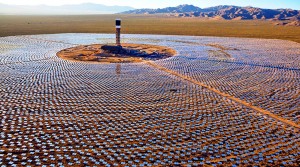Forbes
by Christopher Coats
After a year that saw Morocco take significant steps towards bolstering its renewable portfolio, backers of the Noor-1 solar power plant delayed its opening this week without an explanation.
According to the AFP, the plant was scheduled to be opened on the 27th of December, but was pushed back without further details offered by the project’s communications agency.
In recent years, Morocco has worked to reduce its dependence on foreign sources through the development of domestic projects, including exploring newly found traditional reserves and shale projects. However, the state’s embrace of solar and wind has become a pillar of the country’s energy policy.
The Noor-1 project is the first of three stages planned for solar projects in the North African country, with the door being left open for a potential fourth phase in the future. The Noor 2 and Noor 3 are scheduled to open in 2016 and 2017, respectively.
According to the report, the first stage is expected to provide 160 megawatts and help the country reduce emissions and greenhouse gases.
Earlier this year, the Moroccan Agency for Solar Energy (MASEN) announced that the NOOR II and III solar centers, producing 200 MW and 150MW, respectively, would be financed through a debt/equity ratio of 80/20. The debt will be financed by MASEN and guaranteed by an array of international lenders, including the African Development Bank, French Development Agency, Clean Technology Fund, European Commission, European Investment Bank, Kreditanstalt fur Wiederaufbau and the International Bank.
Northwestern MutualVoice
Making A Difference: How One Non-Profit Is Spreading Warmth All Year
The projects, estimated to cost $2 billion, are a part of a broader solar strategy that aims to produce 14 percent of the country’s overall energy by 2020, according to the report. The financing development appears to back up the country’s earlier claims that Rabat would not need assistance from outside development partners to pursue its renewable goals.
According to The National, the country hopes to provide 42 percent of its energy needs with renewable energy options by 2020, with the remaining coming from fewer imports and a burgeoning domestic production sector.
(photo: summerlinenergy.com)








